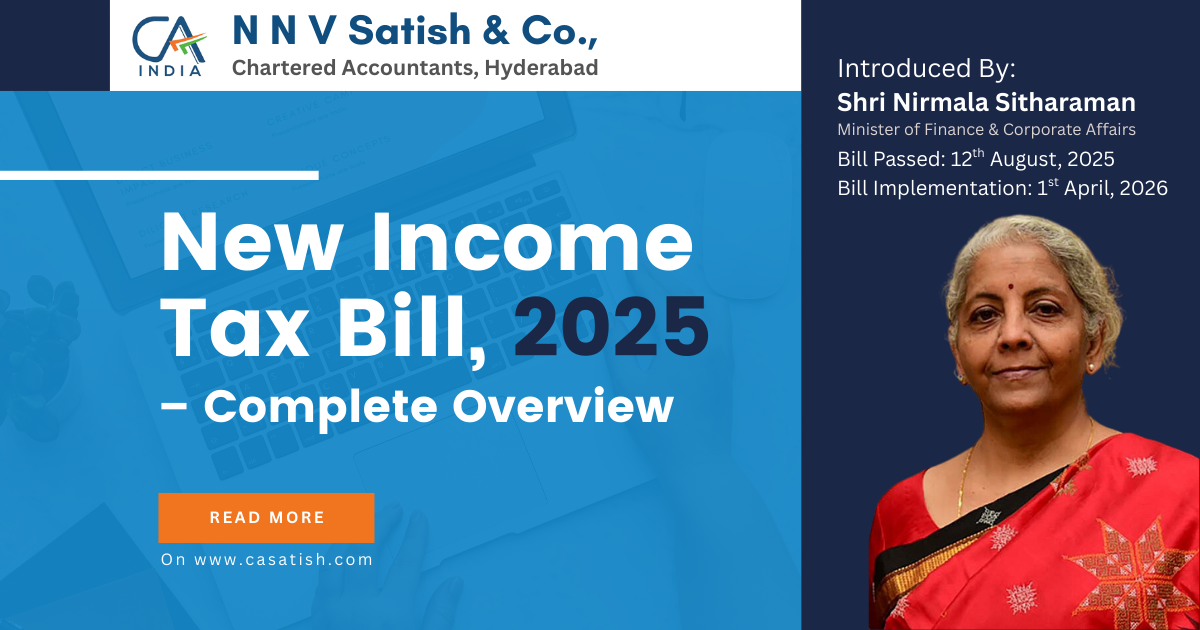Introduction
The Income Tax Bill, 2025, marks the most significant reform in India’s direct tax framework since the 1961 Act. Passed by both Houses of Parliament in August 2025, the bill aims to simplify compliance, enhance transparency, and modernise tax administration. Once it receives Presidential assent, it will replace the existing Income Tax Act, 1961, and is expected to come into force from 1 April 2026.
Key Highlights of the New Bill
1. Simplified Structure & Language
(a) The number of sections has been reduced from over 820 in the previous Act to 536 sections, and the chapters have been halved from 47 to 23.
(b) The total length of the law has been shortened by over 200 pages, making it easier to read and understand.
(c) Redundant clauses, excessive provisos, and repetitive explanations have been removed to make the language straightforward and user-friendly.
2. Introduction of a Single “Tax Year”
(a) The earlier system of “Previous Year” and “Assessment Year” has been replaced with a unified Tax Year.
(b) Income earned between 1 April and 31 March will be assessed and taxed in the same year, aligning with international practices.
(c) This change will simplify record-keeping for both individuals and businesses.
3. Tax Slabs & Regimes
(a) The existing new tax regime announced in the 2025 Union Budget remains unchanged.
(b) No tax is payable on income up to ₹4 lakh, with higher slabs progressively taxed up to 30% for income above ₹24 lakh.
(c) Salaried taxpayers can now claim a standard deduction of ₹75,000, which raises their effective tax-free income threshold to ₹12.75 lakh.
(d) The old regime is still available as an optional choice for taxpayers who wish to continue with it.
4. Digital-First Tax Administration
(a) The bill formalises faceless assessments and remote handling of disputes to reduce human interface and minimise corruption.
(b) A structured Dispute Resolution Panel will handle specific categories of cases, particularly those involving international taxation and transfer pricing.
5. Provisions for Digital Assets & Online Records
(a) The definition of “undisclosed income” now also covers virtual digital assets, including cryptocurrencies and NFTs.
(b) Tax authorities will have legal access to virtual records, including online investment accounts and cloud storage, during search and investigation processes.
6. Organised Deductions & TDS/TCS Rules
(a) Exemptions, deductions, and tax rebates have been moved into clearly defined schedules for easy reference.
(b) All TDS provisions (except on salaries) are grouped under one clause, while salary TDS and TCS have separate, simplified clauses with tabular formats for better clarity
7. Streamlined Compliance & Refunds
(a) Rules for claiming standard deductions—such as those related to house property, pre-construction interest, and commuted pension—are clearly stated.
(b) Refunds can be issued even after the deadline for filing returns, provided a formal notice is given to the taxpayer.
8. Taxpayer Protection Measures
(a) Before any enforcement action is taken, taxpayers must be given proper notice.
(b) Anonymous donations to charitable or religious organisations are restricted unless the funds are used for approved social welfare purposes.
9. Additional Relief Provisions
(a) Before any enforcement action is taken, taxpayers must be given proper notice.
(b) Loss carry-forward benefits are available even if there are changes in a company’s shareholding, under certain conditions.
(c) Definitions for terms such as “capital asset” and “start-up” have been updated for clarity.
(d) Under the new regime, the Section 87A rebate now extends to short-term capital gains, providing additional relief for small investors.
Why This Bill Matters
The New Income Tax Bill is designed to:
(a) Before any enforcement action is taken, taxpayers must be given proper notice.
(b) Loss carry-forward benefits are available even if there are changes in a company’s shareholding, under certain conditions.
(c) Definitions for terms such as “capital asset” and “start-up” have been updated for clarity.
(d) Under the new regime, the Section 87A rebate now extends to short-term capital gains, providing additional relief for small investors.

